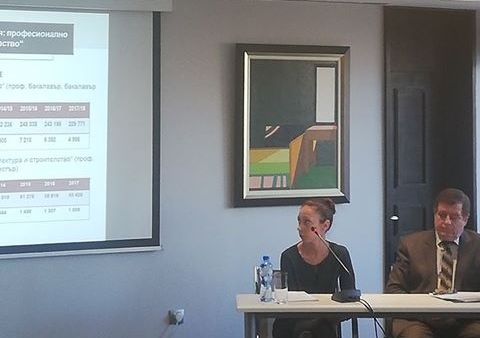Lack of staff, both as quality and quantity, crisis in the education system, demographic problem, global labor market, which creates conditions for emigration and a highly visible internal migration towards bigger cities and respectively – depopulation of smaller towns. This is the brief picture of the labor market, which the Executive President of BIA Radosvet Radev presented to the participants in the national conference “Challenges of the development of human capital in the industry”.
The forum took place today, 25 October 2018, on the premises of BIA, with over 80 representatives of institutions (MLSP, MES, NAVET, etc.), universities, branch employers' organizations and companies, human resources consultancy companies. The organizer of the forum is the Bulgarian Industrial Association, in implementation of Project BG05M9OP001-1.013-0001-C01 “Development of the National Competence Assessment System – MyCompetence”, financed by the Operational Programme “Human Resources Development 2014-2020”. Greetings to the participants in the forum were presented by the President of the Confederation of Labor “Podkrepa” Dimitar Manolov and the President of the Rectors’ Council Prof. Lyuben Totev (Rector of the “St. Ivan Rilski” University of Mining and Geology).
Radosvet Radev identifies several paradoxes that have a large impact on the labor market in Bulgaria:
- Bulgarian students are the favorites of international scientific competitions and, according to the PISA study, are practically functional illiterates;
- We export human resources in conditions of seamless emigration (due to the free movement of people in the EU) and, at the same time, we are forced to think of labor imports, the conditions of which, however, are heavily aggravated and bureaucratic;
- On one hand, we have a conservative education system and aging teachers and, on the other, an accelerated digitization of the economy and young entrepreneurs (startups) seeking people with new knowledge and skills.
According to Radosvet Radev, a potential resource for the labor market are:
- 323,000 unemployed and discouraged people;
- over 30 000 young people who neither study nor work, and by this indicator we are in the top three of the EU (with only Italy and Greece ahead of us);
- over 24 000 Bulgarian students abroad, the vast majority of whom prefer to remain in the respective country but must be involved in Bulgaria;
- over 130,000 workers in the public administration, some of which can be transferred to the private sector if the e-government is effectively launched;
- about 300,000 people with disabilities, many of whom have competencies and skills, and a desire to work;
- over 1.3 million people in retirement age, many of whom (so-called young retirees) have a physical opportunity and willingness to remain on the labor market.
- Last but not least, third-country workers whose attraction can be achieved by speeding up bilateral agreements between Bulgaria and the countries concerned, as well as by alleviating the administrative procedures for the so-called “import” of workers.
In order to overcome the labor market deficits, the Executive President of BIA recommended the implementation of a more active demographic policy, a wider application of the flexible forms of training, dual training, the synchronization of admissions in higher education with labor market requirements, the approximation of educational to professional standards, the facilitation of labor import procedures and, most importantly, the cessation of emigration by creating better conditions for life and work through reforms in the key socio-economic spheres.
“We pass from graduation to certification. The employer looks for people’s skills and competences for a job, not a diploma. Everyone should participate in the forecasting of the labor market with common efforts,” Tomcho Tomov, head of the National Competence Assessment Center at BIA, told the participants in the forum. He outlined the benefits of the MyCompetence information system, noting that the clear professional standards included in it contribute to increasing competitiveness by clearly defining the criteria for demand and supply of a workforce with certain skills and competencies. According to Tomcho Tomov, the information system needs to become sustainable, stressing that it is already sought and well known among the professionals in human resources management not only in Bulgaria but also in the EU.









